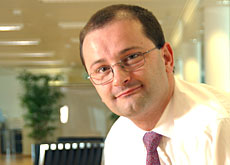
Swiss official shoots to basketball success (INTERVIEW)

Basel-born Patrick Baumann, who heads the International Basketball Federation (FIBA), has just been appointed to the International Olympic Committee (IOC).
Basketball has been Baumann’s passion since he was a child. He tells swissinfo about his work promoting the sport, the outlook for Switzerland, and how he no longer has time to get on the court himself.
The sport has gained in popularity in Switzerland since Thabo Sefolosha became the first ever Swiss player to join a club in the prestigious National Basketball Association (NBA) in the United States.
swissinfo: Would you describe your nomination to the IOC last July as your crowning achievement?
Patrick Baumann: It was clearly one of FIBA’s goals. But as far as I’m concerned it’s an extraordinary opportunity and a great privilege, because I am still young and still learning.
swissinfo: Switzerland is well represented within world sports organisations and many associations have their headquarters in the country. How do you explain this?
P.B.: The Swiss are well represented, that’s true. Our country’s characteristics, such as being multilingual, multicultural and neutral, work in Swiss candidates’ favour. But whether you are Swiss or not, you still have to be successful once you have been elected! And this is down to the type of person, regardless of their nationality.
Switzerland offers an attractive environment to sports organisations. The authorities know how they work and special conditions, notably for taxation, already exist. When FIBA was choosing its new headquarters [which have been in Geneva since 2002], we also bore in mind that it was founded in Geneva 75 years ago.
On a general level, our country has a certain charisma and plays a role internationally. For many people Switzerland is far more than just banks, watches and chocolate. I am just a little concerned about the level of basketball, which is not where it should be yet.
swissinfo: But there is the “Sefolosha effect”…
P.B.: Absolutely and that’s good. Nowadays we have a national team of which we can be proud and which deserves to be supported despite having just failed to join the European elite. Having an extraordinary player like Thabo Sefolosha is a real opportunity for Swiss basketball. There is always a connection between the success of a player in the NBA and how basketball progresses in his home country.
A dynamic is created and young people want to imitate him. But the sports industry, the Swiss Basketball Association and infrastructure need to follow, for example by offering more time for basketball in sports halls.
swissinfo: It’s also a chance to build up basketball in the German-speaking part of the country.
P.B.: You need results on court for that. French- and Italian-speaking Switzerland are close to France and Italy, which have a long basketball tradition and excellent quality championships. Germany is not yet at this level, but is making great progress. German-speaking Switzerland will end up being affected too, even if there is currently only one German-speaking team in the Swiss first division.
swissinfo: Is basketball still very much influenced by the NBA?
P.B.: The NBA is an excellent promotion tool for basketball. It’s a commercial entity that makes money for the owners, but as it is associated with the national basketball federation, it continues to make players available for their national teams and therefore for the service of basketball worldwide.
There are, of course, tensions. For example, the NBA lacks a bit of flexibility and transparency when it comes to the international harmonisation of its [doping] tests and penalties. But our sport is relatively unscathed by doping, and the rare cases are more linked to recreational drugs, such as marijuana.
swissinfo: On a personal note, what attracted you to the world of basketball?
P.B.: As a child I lived for a while in Italy where people are crazy about the sport… When I came back to Switzerland to study, basketball was a great way of meeting new people. I went into refereeing and that helped me a lot to reintegrate back into Switzerland.
Later, I was lucky because FIBA was looking for a legal expert. I only needed a few seconds to decide to drop everything and go to Munich to devote myself to the sport, my passion. Unfortunately, I don’t spend much time on the court these days as I’m always in an office or on the plane.
I’ve had to make sacrifices in my family life and I regret not being able to spend more time with my wife and two children, who are an enormous support to me. But that’s the price to pay.
swissinfo-interview: Mathias Froidevaux
Patrick Baumann was born in 1967 in Basel. He is married and the father of two children.
Baumann has spent a lot time abroad, and finished his schooling in Italy. He has a law degree from Lausanne University, a Master in Sport Administration Management from the IOC and University of Lyon, France, and an MBA from the University of Chicago, Graduate School of Business.
He joined FIBA in 1994 as a legal expert and was promoted to Deputy Secretary General of FIBA, before becoming Secretary General in 2003.
Baumann was elected member of the IOC this year. He is the fifth Swiss to be given the honour, after Denis Oswald, René Fasel, Sepp Blatter and Gian-Franco Kasper.
He speaks French, German, Italian, English and Spanish.

In compliance with the JTI standards
More: SWI swissinfo.ch certified by the Journalism Trust Initiative



























You can find an overview of ongoing debates with our journalists here . Please join us!
If you want to start a conversation about a topic raised in this article or want to report factual errors, email us at english@swissinfo.ch.